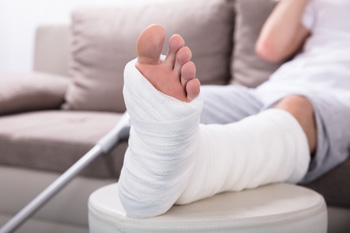Blog
Preventing Cycling Injuries
 Cycling is becoming increasingly popular as a form of exercise. However, as a cyclist, you must be wary of injuries to your ankle or foot. Luckily, there are preventative measures that you can take to save yourself from the pain of an injury. One of the most common ankle injuries from cycling is Achilles tendonitis, an overuse injury of the tendon that runs from the calf muscle to the back of the foot. Training too much, or too hard too quickly, can increase your risk of Achilles tendonitis. To help prevent this injury, try to break up your cycling to allow adequate time for rest and healing. Another common problem among cyclists is foot numbness. This may be caused by ill-fitting shoes or a lot of uphill riding. To help prevent foot numbness, make sure that you are wearing properly-fitted shoes, and add more variety to your rides so that you are not always cycling uphill. For more information on how to prevent and treat cycling injuries of the feet and ankles, talk to a podiatrist today.
Cycling is becoming increasingly popular as a form of exercise. However, as a cyclist, you must be wary of injuries to your ankle or foot. Luckily, there are preventative measures that you can take to save yourself from the pain of an injury. One of the most common ankle injuries from cycling is Achilles tendonitis, an overuse injury of the tendon that runs from the calf muscle to the back of the foot. Training too much, or too hard too quickly, can increase your risk of Achilles tendonitis. To help prevent this injury, try to break up your cycling to allow adequate time for rest and healing. Another common problem among cyclists is foot numbness. This may be caused by ill-fitting shoes or a lot of uphill riding. To help prevent foot numbness, make sure that you are wearing properly-fitted shoes, and add more variety to your rides so that you are not always cycling uphill. For more information on how to prevent and treat cycling injuries of the feet and ankles, talk to a podiatrist today.
Sports related foot and ankle injuries require proper treatment before players can go back to their regular routines. For more information, contact one of our podiatrists of Pennsylvania. Our doctors can provide the care you need to keep you pain-free and on your feet.
Sports Related Foot and Ankle Injuries
Foot and ankle injuries are a common occurrence when it comes to athletes of any sport. While many athletes dismiss the initial aches and pains, the truth is that ignoring potential foot and ankle injuries can lead to serious problems. As athletes continue to place pressure and strain the area further, a mild injury can turn into something as serious as a rupture and may lead to a permanent disability. There are many factors that contribute to sports related foot and ankle injuries, which include failure to warm up properly, not providing support or wearing bad footwear. Common injuries and conditions athletes face, including:
- Plantar Fasciitis
- Plantar Fasciosis
- Achilles Tendinitis
- Achilles Tendon Rupture
- Ankle Sprains
Sports related injuries are commonly treated using the RICE method. This includes rest, applying ice to the injured area, compression and elevating the ankle. More serious sprains and injuries may require surgery, which could include arthroscopic and reconstructive surgery. Rehabilitation and therapy may also be required in order to get any recovering athlete to become fully functional again. Any unusual aches and pains an athlete sustains must be evaluated by a licensed, reputable medical professional.
If you have any questions please feel free to contact one of our offices located in Plymouth Meeting and Ambler, PA . We offer the newest diagnostic and treatment technologies for all your foot and ankle needs.
Increased BMI May Cause More Foot Pain
 Obesity can impact the health of your body in a variety of ways. But did you know that it can also impact the health of your feet? A recent study of over 2000 people found that overweight and obese people were more likely to experience foot pain. Furthermore, as BMI increased, so did the likelihood of experiencing foot pain. The explanation for this may be fairly simple. The feet support the weight of the entire body. As that weight increases, the feet are put under more pressure and strain, which can eventually lead to pain. If you experience foot pain, it is recommended that you see a podiatrist, who can provide a diagnosis and appropriate treatment options for you.
Obesity can impact the health of your body in a variety of ways. But did you know that it can also impact the health of your feet? A recent study of over 2000 people found that overweight and obese people were more likely to experience foot pain. Furthermore, as BMI increased, so did the likelihood of experiencing foot pain. The explanation for this may be fairly simple. The feet support the weight of the entire body. As that weight increases, the feet are put under more pressure and strain, which can eventually lead to pain. If you experience foot pain, it is recommended that you see a podiatrist, who can provide a diagnosis and appropriate treatment options for you.
The more you weigh, the harder your feet must work to support your body. If you’re an obese individual and are concerned about your feet, contact one of our podiatrists from Pennsylvania. Our doctors can provide the care you need to keep you pain-free and on your feet.
Obesity and Your Feet
People who are overweight are putting more pressure on their ankles, knees, and hips as well as their feet. This unfortunately can lead to variety of different issues.
Problems & Complications Stemming from Obesity
- When the body is overweight, it tries to compensate by changing the way that it moves. An obese person may lean forward and put extra weight on the wrong part of the foot. This puts unnecessary stress on the feet.
- Obese people are also more likely to develop type II diabetes which is a condition that causes a lot of foot problems. People with diabetes often don’t feel the cuts and sores that they may have on their feet, which can lead to more complicated and severe issues.
- Plantar fasciitis is another foot condition that can be caused by obesity. Plantar fasciitis is an inflammation of the tissue along the bottom of the foot, which causes pain and stiffness while walking and climbing stairs.
If you have any questions, please feel free to contact one of our offices located in Plymouth Meeting and Ambler, PA . We offer the newest diagnostic and treatment technologies for all your foot care needs.
Preventing Stress Fractures
 A stress fracture is a small crack in a bone that can cause swelling and pain that increases over time. Stress fractures in the feet and ankles are notoriously common among runners and athletes who participate in sports that require frequent running, such as soccer. A stress fracture can take weeks or even months to heal, often requiring a walking boot, brace, or crutches to keep weight off of the affected foot. This can sideline an athlete from both their sport and activities of daily living. Fortunately, there are things that you can do that might prevent these injuries. When running, increase the amount of miles that you run slowly, as running too much too soon puts enormous strain on your muscles and bones. You may want to take days off from your sport or exercise routine to rest your feet. It is also recommended that you get enough sleep, eat a balanced diet, and avoid processed sugars, which can increase inflammation in the body. If you suspect you may have a stress fracture or want to learn more about what you can do to prevent this injury, consult with a podiatrist today.
A stress fracture is a small crack in a bone that can cause swelling and pain that increases over time. Stress fractures in the feet and ankles are notoriously common among runners and athletes who participate in sports that require frequent running, such as soccer. A stress fracture can take weeks or even months to heal, often requiring a walking boot, brace, or crutches to keep weight off of the affected foot. This can sideline an athlete from both their sport and activities of daily living. Fortunately, there are things that you can do that might prevent these injuries. When running, increase the amount of miles that you run slowly, as running too much too soon puts enormous strain on your muscles and bones. You may want to take days off from your sport or exercise routine to rest your feet. It is also recommended that you get enough sleep, eat a balanced diet, and avoid processed sugars, which can increase inflammation in the body. If you suspect you may have a stress fracture or want to learn more about what you can do to prevent this injury, consult with a podiatrist today.
Stress fractures occur when there is a tiny crack within a bone. To learn more, contact one of our podiatrists from Pennsylvania. Our doctors can provide the care you need to keep you pain free and on your feet.
How Are They Caused?
Stress fractures are the result of repetitive force being placed on the bone. Since the lower leg and feet often carry most of the body’s weight, stress fractures are likely to occur in these areas. If you rush into a new exercise, you are more likely to develop a stress fracture since you are starting too much, too soon. Pain resulting from stress fractures may go unnoticed at first, however it may start to worsen over time.
Risk Factors
- Gender – They are more commonly found in women compared to men.
- Foot Problems – People with unusual arches in their feet are more likely to develop stress fractures.
- Certain Sports – Dancers, gymnasts, tennis players, runners, and basketball players are more likely to develop stress fractures.
- Lack of Nutrients – A lack of vitamin D and calcium may weaken the bones and make you more prone to stress fractures
- Weak Bones – Osteoporosis can weaken the bones therefore resulting in stress fractures
Stress fractures do not always heal properly, so it is important that you seek help from a podiatrist if you suspect you may have one. Ignoring your stress fracture may cause it to worsen, and you may develop chronic pain as well as additional fractures.
If you have any questions, please feel free to contact one of our offices located in Plymouth Meeting and Ambler, PA . We offer the newest diagnostic and treatment technologies for all your foot care needs.

